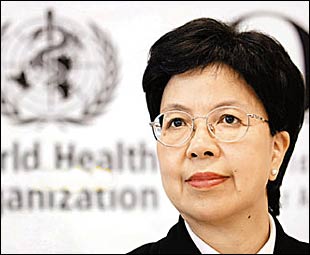| Tools: Save | Print | E-mail | Most Read |
| Margaret Chan Nominated as Next WHO Chief |
| Adjust font size: |
Coming after four rounds of secret balloting by the UN agency's 34-nation Executive Board, the nomination meant the elimination of four other heavyweight competitors. Chan, 59, joined the WHO in 2003 and has since been the agency's top official for pandemic influenza, as well as the assistant director-general for communicable diseases. Her challengers in the race included The five finalists were selected from an original list of 11 candidates, who had been recommended by their respective governments to head the U.N. agency following the sudden death of former WHO Director-General Dr Lee Jong-wook in May. "I'm deeply honored by your confidence," Chan told the Executive Board after its members finally nominated her as the new WHO chief, stating her feeling of "deep responsibility."
Having led in all four rounds of balloting, Chan's nomination seemed assure when Shigero Omi, seen as her strongest competitor, was eliminated in the third round. Chan finally got 24 ballots in the last round, defeating the only remaining rival, "You can be sure that I will work tirelessly and I will open my ears to all to listen to all voices," Chan told the Executive Board after the voting. According to WHO election procedures, Chan's nomination has to be approved by the decision-making World Health Assembly, which will meet on Thursday and will be attended by all 193 WHO member states. Chan said that if her nomination was confirmed on Thursday, she would pursue the legacy of former WHO Director-General Lee Jong-wook, and his predecessors. "I have the commitment, the passion and ability to serve this organization, and I have the determination to achieve results for health," Chan said. Chan also expressed hope to cooperate with her rivals in the race, since some were her colleagues in the WHO. "I'm looking forward to cooperating to make the world a healthy place." Chan, as As a senior WHO official since 2003, Chan also unveiled a series of initiatives to revitalize the agency, aiming its focus at helping countries combat diseases, including a possible bird flu pandemic. She also pledged to reduce child mortality and combat Aids in developing countries if she were elected to succeed Dr Lee Jong-wook, of "My confidence is in the WHO. Working for the WHO in the past three years has allowed me to realize my vision, to apply my public health experience on a global scale to serve the world's interests," Chan said in the campaigning period ahead of the election. Straightforward and outspoken, Chan also said that she would not give China any favorable treatment if elected as the WHO chief, despite her Chinese nationality and full backing by China in her bid. "If elected, I'm not serving Hong Kong's interests and I am not serving "Now, I'm running this campaign as a Chinese national. If elected, once you are appointed, you need to leave behind your nationality, so to speak, because you are serving the world." The WHO is the UN's specialized health agency. It was established in 1948 with the objective of helping all peoples attain the highest possible level of health. It has attracted increasing attention in recent years with its leading role in the global struggle against such challenges as a bird flu pandemic, Aids, medically-resistant diseases or rising chronic illnesses and dilapidated healthcare in poor countries (Xinhua News Agency November 9, 2006) |
| Tools: Save | Print | E-mail | Most Read |
 |
| Related Stories |
|
|
Product Directory China Search |
Country Search Hot Buys |


